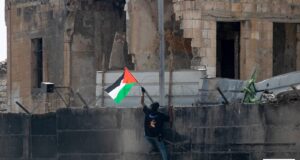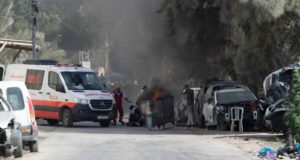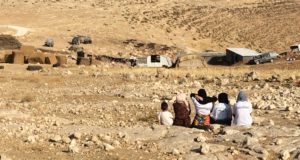13 June 2010

Over a thousand demonstrators attended the fifth anniversary of demonstrations in Bil\’in
Amnesty International has urged an Israeli military court not to convict a Palestinian non-violent activist who has been detained since last July, after he took part in a protest against the Israeli built fence/wall on Palestinian land.
Adeeb Abu Rahma has been charged with “being present in a declared military zone”, “incitement” and “activity against public order”. There is a real concern that the Ofer Military Court in the Israeli-occupied West Bank will convict him on Sunday.
“A guilty verdict would set a worrying precedent for other activists charged and awaiting trial, as Adeeb Abu Rahma would be the first activist against the fence/wall to be brought to a full evidential trial in a case of this kind,” said Amnesty International.
Many Palestinians who protest non-violently against the fence/wall are detained without charge or trial, others who are charged with offences such as stone-throwing will frequently enter plea bargains.
Adeeb Abu Rahma has denied all charges, other than stating that he was present on a number of different occasions in non-violent demonstrations against the fence/wall.
An initial charge made against him for inciting others to throw stones was withdrawn following arguments and evidence put forward by his legal defence.
The activist has repeatedly expressed his commitment to the principle of non-violence. Amnesty International said it is unaware of any credible evidence that he may have used or advocated violence.
“The broad scope of Israeli military orders mean that Adeeb Abu Rahma could be imprisoned solely for legitimately exercizing his right to freedom of expression in opposing Israeli policies in the West Bank,” said Amnesty International.
“If this is the case, we would regard him as a prisoner of conscience who should be released immediately and unconditionally.”
Under military orders that are applied to Palestinians living under Israeli occupation in the West Bank someone convicted under “Acts of Incitement and Hostile Propaganda” can be subject to imprisonment of ten years or a fine or both. The charge of “Activity Against Public Order” can carry a prison sentence of five years.
Adeeb Abu Rahma, a taxi-driver and father of nine from the West Bank village of Bil’in, was arrested at around 1.30pm on 10 July 2009 while taking part in the weekly demonstration against the fence/wall near Bil’in.
Since March 2009, Adeeb Abu Rahma and his wife Fatima’s families have not been able to visit some 25 acres of their land to cultivate olive trees and cereals as they have been cut off by the fence/wall.
The villagers, together with Palestinian, Israeli and international supporters, have been holding weekly demonstrations for the last five years in protest against the fence/wall and the confiscation of their land by the Israeli authorities.
In March 2010, Israeli soldiers posted flyers in Bil’in declaring that the village and its surrounding area would be a closed military zone every Friday from 8am to 8pm, the day when the protests are held.
While the order applies to “Israeli citizens, foreigners and Palestinians who are not residents of the villages” it states that village residents will not be subject to it.
The arrests of three prominent activists against the fence/wall last year – Mohammed Othman, Abdallah Abu Rahma and Jamal Juma’ – indicated a crackdown on the legitimate expression of opposition to the construction of the fence/wall through the occupied West Bank.
Mohammed Othman and Jamal Juma’ were released without charge in January 2010 following international calls for the end of their detention.
Abdallah Abu Rahma head of the “Popular Committee Against the Wall” in Bil’in, who was arrested on 10 December 2009, is still in detention.
In the last two years, Israeli forces have killed eight people, including a ten-year old boy and two teenagers, at the sites of anti-wall demonstrations and injured scores more, some very seriously.
The Israeli authorities have failed to produce credible evidence that those killed posed a threat to the lives of the soldiers involved.
The Israeli 700-kilometre fence/wall runs from north to south of the West Bank, encircling Palestinian villages as well as whole neighbourhoods in and around East Jerusalem.
The majority of the fence/wall is not built on the “Green Line” (the 1949 armistice line which separates the State of Israel from the occupied West Bank) but is located on Palestinian land inside the West Bank, separating Palestinian towns, villages, communities and families from each other and vital services, as well as cutting off Palestinian farmers from their land.
In June 2004 the International Court of Justice issued a unanimous advisory opinion which stated that the construction of the wall in the OPT is contrary to international law and that Israel was obliged to dismantled sections already built there and provide reparation to Palestinians affected by the construction. The Israeli government rejected these recommendations.
Furthermore, when Palestinians, together with Israeli and international supporters, have demonstrated against the fence/wall, Israeli forces have often used excessive force against them. Some demonstrations are conducted peacefully; in others, some protestors throw stones at the Israeli military or attempt to damage the fence/wall.
 International Solidarity Movement Nonviolence. Justice. Freedom.
International Solidarity Movement Nonviolence. Justice. Freedom.


